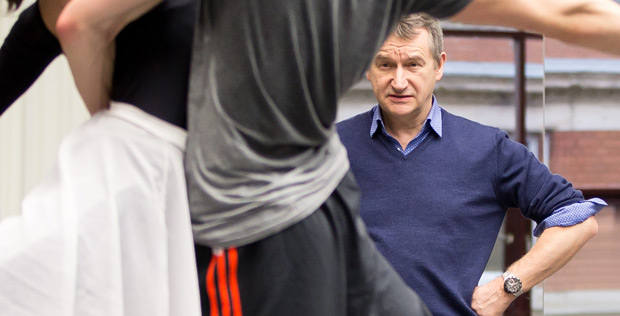
© Andrew Ross. (Click image for larger version)
“It’s a great place to be and I love it.”
So says David Bintley as he celebrates 20 years directing Birmingham Royal Ballet. It’s a tough job and while he faces his challenges it’s clear he is as happy as Larry there and, at 57, not about to retire.
Following in the footsteps of Frederick Ashton and Kenneth MacMillan, Bintley is an English choreographer to the core who loves creating new dramatic works on his 60 dancers. The company is his instrument and to say his approach is traditional is probably an understatement, but he believes passionately in ballet itself, and not in seeing it, or the classics, watered down.
He relishes working and touring outside London, and the company, unlike some others, has recently secured significant extra funding to tour more. He’s the great ambassador for ballet, casting it not as posh, or cutting edge, performing art but as dance that touches and enriches the life of people across the nation.
I spoke to him at length last month and rather than compact it down I wanted to convey the man for the most part in his own words and to split things into convenient topics. We started with his plans around the celebration of his 20 years at the top (and where I use some supplied BRB words on his thoughts) but expanded out into what makes him tick and his journey over the 20 years. It’s a long page and to make it easier here is an index so you can jump straight to what interests you…
David Bintley – topics covered
Celebrating 20 years at the top of BRB with something old, something new and something borrowed
Also celebrating BRB’s 25 years of existence
BRB, Birmingham and ballet – not just about doing a good show
How the company has changed over the years and growing dance talent
What’s coming up for David Bintley – New Works
How does David Bintley create his ballets?
Contemporary Choreographers and the Classics of Ballet
Being a Director, Staying Sharp and Working in Japan
Why did the future of British Ballet never want to direct The Royal Ballet?
Where will BRB and ballet be in 10 years time?
Celebrating 20 years at the top of BRB with something old, something new and something borrowed
BM: Why did you choose to celebrate your 20 years with the double bill?
Well you’re always looking for reasons for programming things and I suddenly thought – Well it’s 20 years – I guess I’m doing a new piece and the first piece I did in Birmingham.
And those are: Carmina burana (old) and The King Dances (brand new) and being presented at the Birmingham Hippodrome on 17-20 June 2015
What inspired you to make Carmina burana, your first piece for the Birmingham Royal Ballet as Director?
I’d been thinking about it ever since I heard the music when I was 17 and I just loved it. Then when we were coming up to my opening night with Birmingham Royal Ballet I didn’t want to creep in and do something nice and pretty. I wanted to do something that was a landmark and I was the boss, so I allowed myself to have a choir which I couldn’t have had until that point! The idea was to have a local choir (Birmingham’s Ex Cathedra Choir), to get everybody in the company on stage, to present something really big and ambitious, and to get everyone involved in something really daring. Carmina burana was born!
What was the critical and public reaction to Carmina burana in 1995?
The public reaction was fantastic. I’m afraid I don’t read the reviews! The public loved it and have done ever since; it’s one of the most popular pieces that we do. In a sense it has become a modern signature piece.
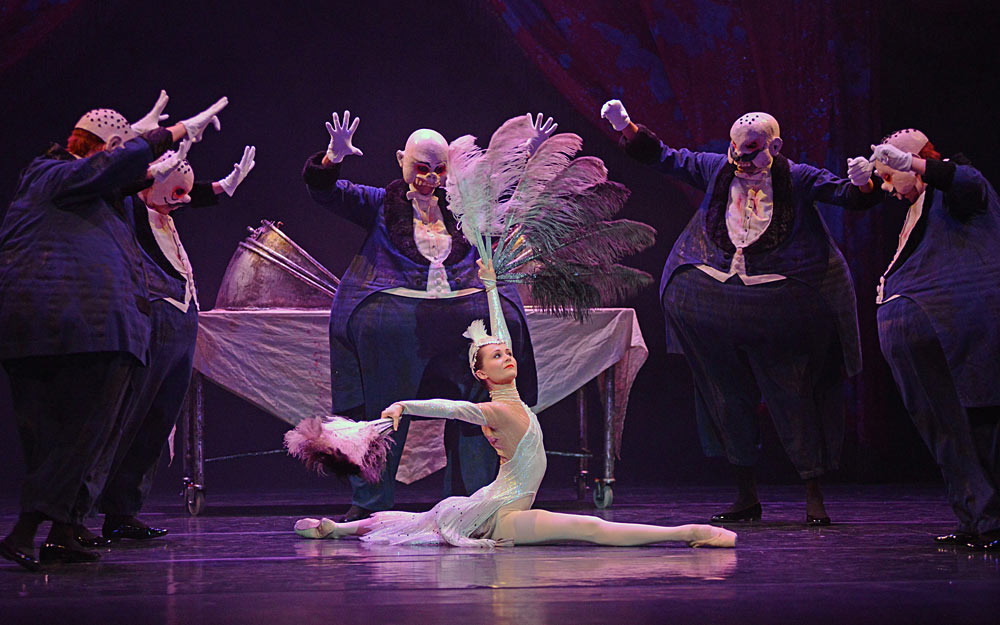
© Dave Morgan. (Click image for larger version)
The new piece, The King Dances, sounds interesting with your going back to Louis XIV of France and re-imagining the very beginnings of ballet. We look forward to seeing it in Birmingham.
For me it’s not an ideal pairing – the new piece with Carmina burana – because Carmina is quite strong and The King Dances isn’t really an opener. But you know sometimes you are forced into that. I had to move it three times, just because of the money – financial years – not allowing. It’s frustrating because people look at things and they say “Well why is that with that, and why is that with that” – when it’s just down to cash flow.
And so in London we celebrate your 20 years with Carmina and Balanchine’s Serenade (Coliseum: 19-21 March 2015). What is it about George Balanchine and his work that inspires you
In a sense coming from the English tradition which is far more rooted in theatre, narrative and theme work, I like Balanchine’s work because it’s almost the opposite. He doesn’t really do things like us; he favours pure dance and in that respect that’s why I like his work. He’s one of the few people that have an enormous body of work, most of which is a classical choreographer’s response to a wide variety of music. There’s virtually nobody who has achieved that, and that’s down to his tremendous invention. They’re great works. I mean he made some of the greatest works of the 20th century; it’s a great contrast to our own work. Most of his ballets were one act ballets so they’re very useful to Birmingham Royal Ballet because they’re classical. They also keep us tuned as dancers if we’ve got work which is more narrative such as Miracle in the Gorbals. You can’t stay on your best mettle as a classical dancer if you’re doing a huge amount of narrative work which doesn’t test your technique. So Balanchine is never far from our repertoire. He’s intensely musical as well, which is beautiful.
When did you first see Serenade and what captivated you about it?
I think I probably saw a film of it done by New York City Ballet. It is virtually the signature piece of the New York City Ballet; it’s got to be one of everybody’s desert island ballets. Balanchine made it in the 1930s when there were virtually no men dancing so it is predominantly a ballet for women; it’s almost about women. It’s very romantic as well. It has Tchaikovsky’s beautiful Serenade for Strings for its score. It’s exquisite, which isn’t a word I use often but it really is just beautiful. You only have to hear the first few strains of that music and the Balanchine ballet is in your head. It’s indivisible from that music now, I think.

© Dave Morgan. (Click image for larger version)
A great double bill – how did you programme them together?
Well what we found with Carmina particularly is it goes well with Balanchine. So we’ve done it with Serenade before and we did quite successfully with Agon. It started off with Birthday Offering and the two were so wildly different. We got a very young audience in on the first run of Carmina and they weren’t interested in Birthday Offering at all. And then we found that when it was Balanchine it worked; the Balanchine is a little bit more neutral, shall we say, a bit less classical, especially Agon. And also the Balanchine always gives the girls a good work out and Carmina is a guys’ piece I think – apart from the leading roles.
It has been a long time since we saw it – I have fond recollections of Carmina particularly. It shakes out the cobwebs!
I’ve done it in a few places and you never know when something is that old: does it stand up? does it still work? does it still have that ‘something’? But I’ve done it in a couple of other places and it seems to and I’m thankful for that.
Also celebrating BRB’s 25 years of existence
Not sure it was controversial at the time, but it was a surprise and gave pause for thought when Sadlers Wells Royal Ballet moved to Birmingham. Given the long view, has it worked? Is it better because it’s now not in London?
I think given what The Royal Ballet, and The Royal Opera House, went through in the 80’s and 90’s I doubt whether we would even be in existence. I think the company would have been thrown to the wolves. It might have started up again in a different guise. Who knows, it might have been an RB touring company again like the old days.
But no, the move was the making of this company – the absolute making of it. For me it goes deeper than that. It’s really about, and I know this is the same for the Arts Council as well, it’s about what is it to be a ballet company? Is it about a bunch of dancers that put on a nice show? What does it mean to be here in this city is, for me, a completely different kind of thing to the Royal Ballet. This is a resource.
BRB, Birmingham and ballet – not just about doing a good show
It’s a very different audience whenever I come up here from London – it’s much more about ‘ordinary’ people it seems to me.
Yep – absolutely, and more than that, it isn’t just about the shows, it’s about the interaction with the whole of this region, at all of the different levels. Whether it’s in a university, whether it’s in prisons, whether it’s in schools for young people with learning difficulties, or it’s an interaction that we have with our pre-vocational kids. We go to around 50 primary schools every year. We trawl through those schools to find talent and give it everything it needs to blossom. And that’s a million miles away from just putting on a great show.
It really is not just about money. You know, getting people in to see the company it’s not about “how much can we charge them for that”. It isn’t about that – it’s just about spreading that word, you know, getting at all of those levels of the community that surrounds you.

© Richard Battye. (Click image for larger version)
And we involve local press in international touring. Since we did Hong Kong about 15 years ago, we have been taking local press with us. So we have very good coverage locally of what we do elsewhere as well.
How the company has changed over the years and growing dance talent
Knowing what you know now, if you were parachuting into Birmingham again, would you approach your directorship differently?
Well I did plenty of stupid things, you know, to start. Didn’t know how to help people, didn’t know how to help them with their lives. Not very diplomatic – a bull in a china shop! But that’s to be expected isn’t it. You just gradually learn all of that.
I thought it was a very exciting time. It was very exciting because we really did an awful lot – a lot of new things. The company was fairly new… it lost a lot of skill (in the move from London), so it took on a lot of young people, some of them worked out, some of them didn’t. And Peter (Wright – the previous director) was not really running the company for the last couple of years because he was not very well. In 1995 they’d done well but it wasn’t a terrific company.
You brought in a lot of senior talent early on.
I did – the holes were there to be filled. And I’d been working freelance for 2 or 3 years and a lot of people that I’d worked with said, “I’d love to come and work with you.” So instantly we had a really interesting company. And a company full of really the best people that I’d worked with in Africa, in America, in Germany. And that was great.
What I didn’t foresee was that that generation only had 5 – 6 years in them. And my big problem at that moment was the relationship with the Royal Ballet School (RBS) and the other company. We were not as well placed with the school – we weren’t given an even shake. And the in-balance, the reputation of the company and the move to Birmingham had not enhanced what the people in the school thought. And so, with some very notable exceptions, I did not get great service from the school for about 5 or 6 years and suddenly all these great people at the top had gone and I had nothing left.
So I had to rebuild the company and really rework the whole relationship with the school: not by ingratiating but by repeatedly saying we are not being serviced. We cannot just take the scraps – this is unequal, it is not a level playing field and it is not the right of the Royal Ballet just to come into the school and say who are the best four, we’ll have them. It doesn’t work, it’s not good for the dancers, it’s not good for the companies because you end up with a lot of frustrated dancers down there and me not being able to field strong enough casts up here.
So, I would say, from about 2000 – 2004 we were not good. And I was trying to bolster it up by getting people in from outside… we couldn’t attract real quality. I had a couple of dancers from outside and they couldn’t do it for us. But I had no choice because I hadn’t been able to bring them (younger dancers) through.
But now we’re great – we have such strength in depth. I mean we have corps de ballet girls that are doing… well Miki Mizutani: this is her third year and she’s doing Swanilda in a couple of weeks. So it’s great to have that and I had 12 casts of boys on in Nutcracker at Christmas. I had 12 boys that could do the prince in Nutcracker! And one of our soloists was guesting down at English National Ballet – Matt Dingman. (BM: Nice one)
It seems to be a real dilemma for graduating students at RBS, if they think they can get offers from BRB and RB – to be a smaller cog in the well-known RB wheel or go to Birmingham and stand to get much more responsibility much sooner.
That’s the great thing about this company – we are now in a position where the people who are occupying the very top tier of the company were all given those chances when they were right at the bottom. So there is an understanding throughout the company that fair’s fair and I will do the best that I can for everybody. But if somebody comes in this company and can do Swan Lake and they are here in their first week, they’ll do it.
Funding and Selling Dance – £500K of extra grant for more touring but still hard to find money for new dance works
Congratulations on getting £500K extra grant for the next 3 seasons from the Arts Council to do more touring. How?! – not all companies got such extra funding.
Well, it’s a clever move we thought. Because we sat back and we thought that everybody is expecting cuts, everybody is expecting standstill at best. Wouldn’t it be fun if we said can we have some more… so that we could do more. And basically that’s it. I mean we don’t have any more money because that money is earmarked for the extra touring to the extra theatres that we’ve taken on from other companies.

© Richard Battye. (Click image for larger version)
Are you taking on some from English National Ballet (ENB) who don’t want to tour as much?
We are. We are going back to Southampton and we are back to Bristol. (BM: Like the Mayflower) Yes. I like Bristol. I’ve always liked Bristol. I mean the theatre is a bit old and creaky, and smells of gas, but it’s a great city and it’s a really interesting audience – Edward II went crazy there the first time around. I think because of the university. We were full. So we are taking it back in just over a year. (BM: What – Edward II is coming back next year?) It is – yes. (BM: Good!)
When you say you are doing different tours, does that mean different styles of touring – different theatres to usual or different types of bill?
The problem at the moment is that we are so incredibly busy and we couldn’t take on more, not with the advent of these two new venues coming up – from now to the end of the season we don’t have time to breathe, we literally don’t.
We are looking for a new CEO; Chris Barron goes in summer, and that will be a massive change for us. He has been here 10 years. And that will be a massive change because whoever comes in will be different and have different ideas. We will see – the problem at the moment, for me, is money for new work. We are not doing enough new work, we are not doing as much as we used to do. And I want that remedied.
But the problem is that you’ve got to make money – ‘cos we lose money all the time. And when you are a company of our style, which ranges over everything from the big 5 ballets, but whose heart is really in the new stuff, you can fall into the trap of just pedalling and selling on the classics. Northern Ballet make money the more they work – the more we work the more we lose money.
One of the things that ENB say is that they can make money by touring internationally.
I wish they would tell us how! Because in our experience you never, ever, ever, make money touring overseas
You mentioned Chris Barron going and that change will follow. Ahead of that I think your new director of marketing, Kara Larson, is from America and must have different perspectives…
She’s very good. She’s very, very good. Kara has come in with a fresh eye and not too soon. She’s really questioned everything – been great. It’s that thing to keep looking at yourself, to keep reassessing what is going on. YES [a big thing comes to mind for Bintley]… gosh how do you work this out… Why did we lose £150K on La Fille mal gardée last summer? It’s not possible is it? It is! (BM: Gulp)
Yep. Why did the triple bill this autumn do so poorly when it seemed like we had such a good story – with Gillian Lynne and Miracle in the Gorbals? How did that happen? So, Kara said the other day “You can sell anything”. So I’m hanging onto that!
What’s coming up for David Bintley – New Works
I’m not asking for the titles but how many big ballets are buzzing around your head. I remember Prince of the Pagodas – it took a long time to unlock… How many others are kind of milling around?
Well it’s a lot less than it was, let’s put it that way, because most of the things I do now are are things which have been there for a long, long time. I don’t rush into things now, at all. I don’t get an idea and suddenly do that next year ‘cos it just doesn’t work like that – financially either.
I have the one which I’m doing next year, I mean we are 20 minutes into the score and I have something in the distance, ummm, it’s not set as yet, but I’m talking to a couple of people about it. It doesn’t have a particular date, doesn’t even have a company at the moment – but it’s sort of there (BM: its sort of on the runway. Wooo – DOESN’T HAVE A COMPANY!?) No – because I mean I would prefer it to be here, but we are talking co-productions now because we have good links with Houston and there is another company at the moment that are going to take some things of mine and I said, why don’t we do something together.
And this whole co-production thing is working out very well for us, because the piece I’m doing next year is a co-production with Houston. So comes at half price! I think it’s one of the world’s worst-kept secrets – I’m doing The Tempest. It’s part of our Shakespeare year, which again is slowly leaking out, but we are doing some major Shakespeare repertoire.
Where will The Tempest be premiered first?
It will be premiered here. It’s not a question of comfort but when you have a knowledge of people and they of you, you can create better. I’ve done the whole schlepping around, making it up on other people, and sometimes it works and sometimes it doesn’t. With something this big, and intimate in a way, it’s better that I make it on people that I know.
How does David Bintley create his ballets?
When you go into the studio to create, do you know what you are going to do – the steps?
No – not a single step. 5 minutes before I go in I might think, maybe it’s something like this, but that is absolutely it. And for the rest of it you just listen. I’m listening all the time. If it’s a narrative, of course you know where the door is and where the window is and if a character comes through the door then you know they are coming through the door. Then I suppose in that sense you are choreographing. But the actual steps themselves, I just don’t do that any more. Because it has to come from them. I think you do that (have steps ready) when you are young, when you don’t have as much time, and when you are not as able as I am now to kind of ‘wing it’. And winging it is the fun of course. That’s the fun because that’s when it’s exciting. It’s like jazz, it’s like suddenly you are off and when that’s happening with a dancer or a group of dancers that’s so exciting.
I remember going in (the studio) when I was doing my second or third piece, with some carefully worked steps and pattern and you suddenly realise it doesn’t work. And you’ve got an hour… and your idea doesn’t work. And 40 people looking at you, when you’re 21 or 22. You’re wasting an awful lot of time if you are planning everything before to find out it doesn’t work. Suddenly you’re thrown. So I don’t worry any more.
I might draw some patterns or something for the corps – if I’m doing corps stuff. Some noughts and crosses on a page. Just to get an idea. When I was doing Cinderella I was in Hamburg – I’d been to see Neumeier. And I was in the hotel and the next day I was flying back coming into Birmingham and straight into the first call for the Waltz – for the stars. And I’d been thinking about this for some time and nothing was coming or it just seemed vague. I had a terrible, terrible, night and didn’t sleep at all and I must have fallen asleep in the small hours and I dreamt the entrance pattern. And never, ever, before or since has that ever happened. It’s quite often you dream something and wake up and then go, “Oh that didn’t seem like such a good idea!”. But I dreamt this pattern and yeah – it looks like a mess on stage, because you cant see the pattern until it suddenly all resolves.
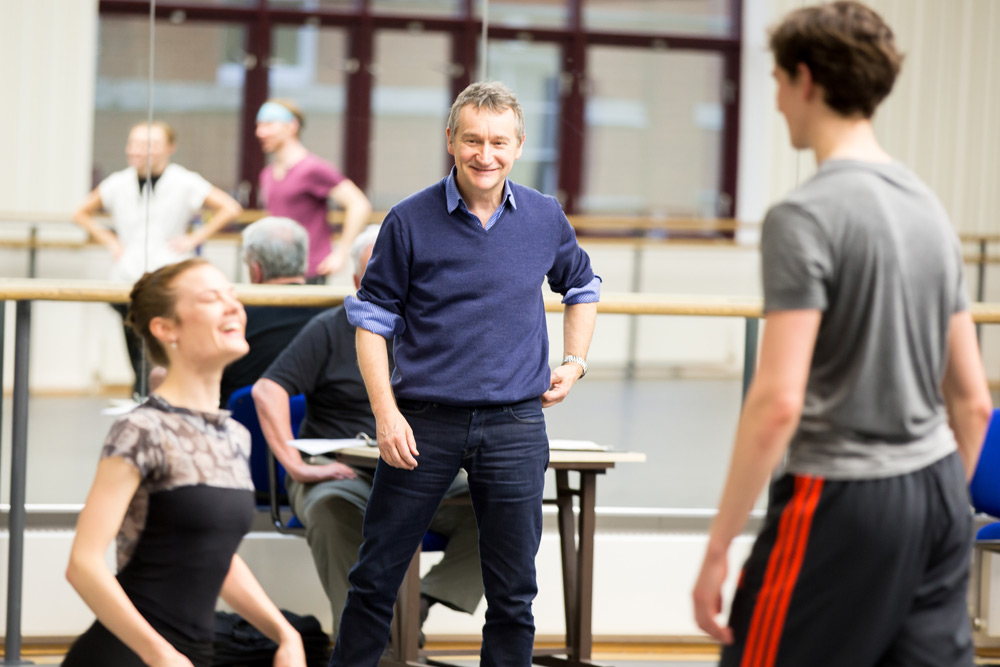
© Andrew Ross. (Click image for larger version)
A lot of young choreographers these days always want a Dramaturge. You don’t, do you…
I don’t know how you could do that. But then you know, without conceit, I was kind of known for being able to act. I couldn’t dance very well, but I could put on wigs. (BM: your Widow Simone is to die for!) But that’s where it comes from for me. It comes from that character that I know, that I can feel and I can touch already. It’s not like Ive got a bunch of steps and I need somebody to make a character out of them. It just doesn’t work like that. I know the shape, the outline of all of those characters; I know how they move – don’t have the steps but you know I don’t need that.
I’ll tell you where I needed a dramaturge was on the first version of Cyrano that I did in 1991 and which did not work. And it didn’t work because I tried to do the whole damn’ play. I really tried to get the whole play in and I thought this was really important and somebody should have said to me – that’s not possible and that’s really stupid! And I didn’t get that. That would have been good. I would have liked a dramaturge on that one (laughing) but eh.. it seems the thing now. In fact we were just up in Edinburgh and Scottish Ballet are going in with Streetcar and you know the top name on the bill is not the composer, it’s not the choreographer, it’s the director – Nancy Meckler – of the RSC (Royal Shakespeare Company). Is that why it’s so good?
Contemporary Choreographers and the Classics of Ballet
We seem to be at a hinge point of change at the moment with contemporary choreographers being asked to do the classics of ballet – Akram Khan’s Giselle for ENB, Paris Opera Ballet’s new Nutcracker using 4 contemp choreographers and Scottish Ballet using David Dawson for their new Swan Lake. What are your perceptions of where ballet is at the moment?
I think you have got to take it case by case. You know the ENB thing is interesting. I wonder what the Giselle is going to be like though? Who’s going to be pleased? Because half the audience will be pleased and half of them won’t be. And are the dancers of English National Ballet being given Giselle to dance? Are the ballerinas down there being given one of the greatest roles in ballet history to dance, or not?
You see in this company I wouldn’t do something like that. Because it’s a story, isn’t it. And I, in terms of those works, I think this is for the dancers to do – its for the dancers to do these roles, and they want to do these roles. They don’t want to do it with a different story. But you know somehow it’s always been like that – was it Mats Ek that started the whole thing? [he is talking in a rather despairing and not so happy voice]
It just adds to that thing that the only way you can actually sell anything new now is still to call it Swan Lake. It’s still the title that matters and it worries me that even in terms of what I’ve done over the past few years, it’s got to have a title, it’s got to have something which has sold half the house before you even put the thing on stage. I worry – where is the next Edward II coming from? or the next Mayerling? Or are we doomed for the next, however long, that if it isn’t a fairy story or a new Swan Lake or a revisionist Sleeping Beauty then we just can’t sell it. I worry that we pander to this and and maybe somebody should just bite the bullet a little bit.
I quite like what Northern Ballet are doing [Bintley is sounding brighter now] because they are not competing in that same market, and I think it’s quite nice to see titles like The Great Gatsby and goodness me, Jonathan Watkins doing 1984. Fantastic. But, you know, is that going to get the 6-year-olds along? But I hope it works, I really hope it works – because it’s brave.
The Ballet Audience
There is a view that ballet is essentially an older person’s and rather middle-class pastime – something you discover later in life rather than when you are 18 or 19. Do you ever worry about that? It seems to worry a lot of others.
That doesn’t worry me because that is the nature of things and I don’t think we are ever going to change that, and actually I don’t think there is anything wrong with middle-aged people suddenly discovering something they have been missing for all of their lives. And that is a story I hear more often than you would imagine. And that’s fine. I think it’s a modern conceit that it’s actually safe and comfortable and middle-class and all those people are kinda stupid, cos, you know, where the real brains are are in the 18- and 19-years-olds nowadays! And I’ve got one and I know they’re not!!! [much joint mirth] So I don’t worry about that, that much. But what I do worry about is the work that we are putting on because that age group and older really liked Edward II when we put it on. You would think maybe they wouldn’t, maybe they just want something with a tune and some swans, fairies. But do I worry – yes I worry all the time! [he smiles and laughs – he worries but not necessarily about this is the message.]
Developing new choreographers
There is always a need to bring through a new generation of choreographers. What are you and Birmingham going to do about bringing through that new generation?
It’s tricky. We did a lot early on because we had a lot of people in the company. We haven’t had, in quite a few years, um… I must be careful here… It’s a question of ‘is the talent there?’ I’m always keen, of course, to do it from within the company. That’s ideally what one wants, but you know we’ve brought people in from outside and this is where I want to do more. But the problem is this – do you think it’s easier to raise £800,000 for a new Cinderella or £50,000 for a young choreographer? That’s the problem and every single new piece that we do has to be funded completely outside of the money that we get (from the Arts Council). There is no pot of money there which is set aside for the making of new work.
BM: I thought one of the new initiatives, when the Arts Council made its ballet funding announcements (i.e. Birmingham getting the £500,000K extra), was that it offered praise to the Royal Ballet for doing things with younger choreographers and it suggested the English companies work in concert in some way to grow young ballet choreographers. Is there any substance to that?
Yes! A couple of things. Obviously the Royal Ballet is not a company run by choreographers – if they want new work then they’ve got to get in new people. The RB is greatly advantaged in terms of its resources, not only in its money, but in the number of people it has in the company. I don’t hire choreographers, I hire dancers. If they can choreograph – great. But I don’t have a place here for somebody who is just going to choreograph. You know I don’t have 100 places, like the Royal Ballet. In terms of trying to make things work together we’re in that dialogue with Kevin (O’Hare – the Royal Ballet artistic director). What I don’t want to see is the Royal Ballet sending down its choreographic proteges to try out down here. And they have a lot of people that they’ve brought on. And they’re actually haemorrhaging choreographers there – Jonathan Watkins and Liam Scarlett’s had to go work elsewhere because… you know. I was resident choreographer there, well resident choreographer in name – I didn’t work that much with them! I did more for San Francisco Ballet in that period than I did there. So it’s tricky. I want to find a way of creating a platform where I can regularly give people, young people, a go at choreographing for the company. The problem at the moment is that it is box office poison and we are not a company that can afford box office poison even when that box office poison is Ashton’s La Fille mal gardée. We cant afford it. We lost £150K in 2 weeks. (BM: was that here?) that was here (Birmingham) and in Nottingham. But mainly here.
Being a Director, Staying Sharp and Working in Japan
BM: 20 years – not many directors stay with a company for 20 years – it’s rare. What works so well for you?
It seems like two minutes. I guess I must be enjoying myself. The thing is that companies don’t stand still, they may appear to, but they are constantly changing. I’m trying to be, sort of, 10 years ahead of the game, by looking at the people I’ve got in the corps – and thinking who are going to be the principals? And I know who they are – sort of! So it’s constantly evolving, so you never feel that ‘Oh, am I treading water, is this interesting?” Well perhaps occasionally – I think that the whole Japanese thing was part of that. [Bintley directed the National Ballet of Japan for 4 years starting in 2008 – as well as continuing to run BRB.] When that came up I suddenly thought, “Is this good, will this be refreshing, will this help me? Will this help them? Will I get a different perspective?” And I did! I learnt an awful lot.
So what did you learn in Japan?
Oh gosh. What I felt, and the reason that they wanted me there, was because obviously I was experienced here; they wanted foreign input, they wanted somebody to come in from outside and kind of teach them. And when I decided to do it I felt very much in that way – you know I’d be giving them all of the experience that I’ve got here and all the things that we do here that work.
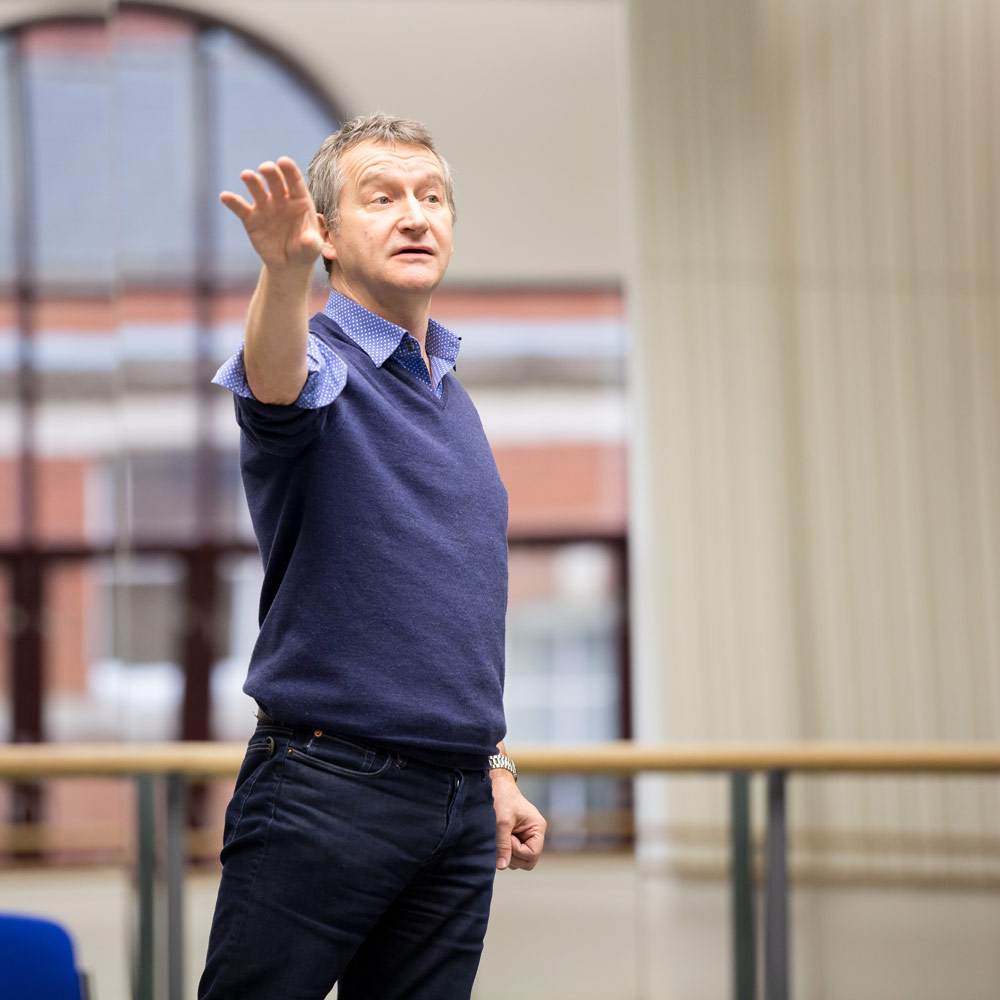
© Andrew Ross. (Click image for larger version)
And now I think back, well that was rather arrogant really because I did learn an awful lot, because when you are doing the same job on the other side of the world in a completely different culture, which approaches ballet in a completely different way, in a financial and political domain which is, again, so entirely different to Britain, you start having to re-look at the art form, what is it?, what does it mean?, how can we do this?, how quick? And so it was suddenly the same job but so different that I began to learn and apply things that worked there, back here in Birmingham. So ways of talking… when you were having to restate the case for the art, again, you start really looking at it and analysing it again. So while I won’t say I learnt this, and I learnt that, it just reinvigorated me in terms of the art form, and working with dancers, because the dancers there are so entirely different: they are so passive and submissive in a way. They are absolutely like sponges and what I found from that was, and what I saw, was that it is very easy to abuse that hunger that they have to do it. And to do it well. But at the same time, you know, that work ethic is extraordinary and we could learn something from that.
We don’t have a problem here, but sometimes you think “wow” we have it pretty good here. They are looked after here, very looked after. But they are great, our dancers.
Why did the future of British Ballet never want to direct The Royal Ballet?
You follow in the tradition of Frederick Ashton and Kenneth MacMillan and for many it was assumed that like them you would run The Royal Ballet. What happened?
Um – it’s not me. It’s not me, it’s not my style, at all. I’m a choreographer, I never wanted to be a director, but I was in a position where I wanted to work in the kind of company I wanted to work in. As a choreographer I wanted to work for a company which did this, did that, believed this, believed that. And I realised the only way to make that happen was to direct that company myself. And that’s why I came here.
I like being a director now. Because I managed to achieve that and I made a place where people do like to come and work. And where we don’t get a big turnover of people because people don’t want to go elsewhere. But I like looking after them as well. But it’s a good number you see – we’ve got 60 dancers and I know them all by name and they are all important to me. I don’t think I’d like 100 dancers… where I knew there were 20 of them not really going anywhere, but they can fill a space.
(BM: I think as number of dancers go up the difficulty is not linear but exponential.)
Yes. See, I like ordinary people in the audience. Because it’s honest – you know – it’s just honest. And if people like it they come running up to you and if they don’t like it you know you hear about it in the car park.
Retirement?
Do you have any feeling about retirement – you don’t remotely look like somebody pondering a different life.
No. It’s hard to say… I want to be useful. If I’m not useful I don’t want to be here. You know I’ve always said and I don’t care where it is – I go where I’m wanted. If people want me then I will go there. If they don’t want me I’m gone. (BM: it was like that at the Royal for you.) It was exactly like that. “I’m a Principal dancer at the Royal Ballet and resident choreographer – this is Mecca isn’t it?!” No! I was so unhappy – that was it and I was not a person that I liked. And I realised after a while, that I was horrible and turned into one of those people. You can become embittered. (BM: it’s a very inward-facing world at times). Yes, and I try not to be. I say to people in the company when it comes to having babies and things like that, that that’s important, that’s more important. Don’t leave it till it’s too late. Or if somebody is agonising about injuries and things like that, it’s a big world, there’s all sorts of things to do.
Where will BRB and ballet be in 10 years time?
Last question – where do you think Birmingham will be in 10 years time?
Do you know if anybody asks me those type of questions, I just like to blow a raspberry!
I’m doing this piece on Louis at the moment (The King Dances), so I’m looking at Baroque dance quite a lot and we had a lady in from France who we were doing some work with. And looking at the steps, the kind of arm moves and the vocabulary of dance from Louis XIV’s time. And it’s completely recognisable to us. It’s basically what we do. It’s different of course, but it is what we do – it’s the same language. It’s like Shakespeare’s language and our language nowadays. It’s still the language. And that language ties that whole 400 years in – it’s still the same language and it will still be the same language in 10 years in Birmingham. In 100 years in Birmingham it will still be the same language. But what is the language of contemporary dance? There is no language – it’s the individual, you know: Graham, Cunningham, Morris – it’s another kind of accent isn’t it – but it’s not a language.
BM: Well we look forward to seeing your next 20 years then!
Well I hesitated to say that “I hope I’m still here in 20 years”!
BM: Thank you.
It’s a great place to be and I love it.
BM: you seem to have found your perfect place…
Yes! But you’ve always got to ask yourself, you’ve always got to keep saying “Am I good for it?”, “Is it working? Am I still bringing something here?” As I say, when it isn’t I hope somebody will tell me. And then retirement? No! I’ll go somewhere else where they want me!

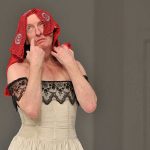






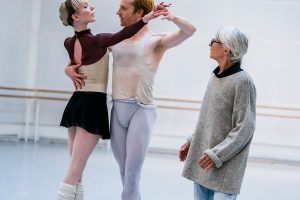
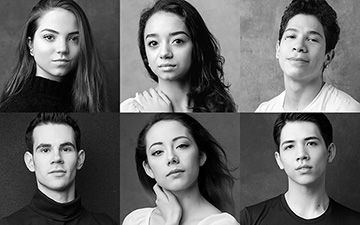


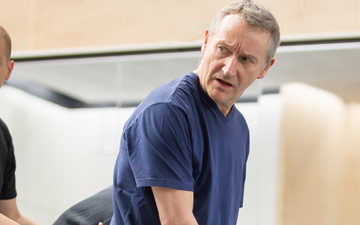


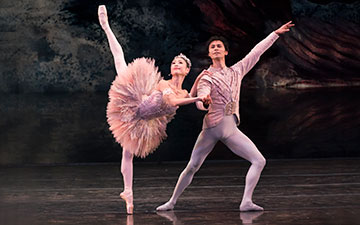

You must be logged in to post a comment.